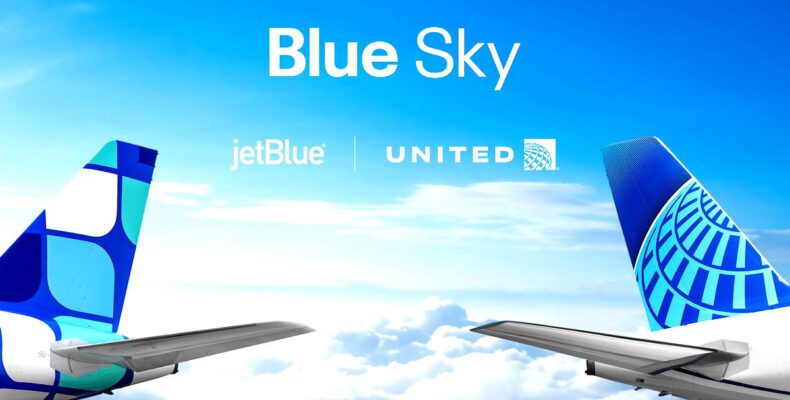Spirit Challenges United-JetBlue Alliance
JetBlue Airways and United Airlines recently revealed their plan to buddy up with a partnership cheekily dubbed “Blue Sky.” You might be wondering, what’s all this about? Well, they’re talking frequent flyer reciprocity, possibly swapping slot positions, and more. It’s meant to start small and eventually balloon into something bigger.
But, before this alliance even spreads its wings, Spirit Airlines is already throwing a wrench in the works. They’re questioning what this partnership means for the competitive scene.
Spirit Wants DOT to Scrutinize United & JetBlue Team-Up
Spirit has officially gone to the Department of Transportation (DOT), waving a complaint and asking them to give this partnership a bit more scrutiny. Specifically, they’re asking for more transparency about the JetBlue and United deal, complete with a nice period for public commentary.
The thing is, Spirit’s pointing to history. Back when the American and JetBlue Northeast Alliance was being talked about in 2021, United was all for public access to the nitty-gritty details. So, Spirit figures, why shouldn’t the same rules apply now?
Although the details of this so-called “Blue Sky” partnership are still under wraps, Spirit’s spidey sense is tingling with concerns about competitive fairness and public interest, akin to the past Northeast Alliance drama. Based on what’s out there, Spirit’s not mincing words, claiming it looks like an “anticompetitive unfair method of competition that must be prohibited.”
High-level perspective? The “Blue Sky” tie-up reeks of anti-competitive vibes similar to the NEA. JetBlue could end up cozied up to United, seduced by United’s sprawling global network. Despite what they say about managing and pricing their networks independently, JetBlue’s decisions will likely need a nod of approval from United. Plus, JetBlue will have to shell out for pricier United miles to offer hope of connectivity to its loyalty members. This added cost would naturally pass on to customers through higher fares.
Moreover, there’s talk of synchronicity on corporate accounts and a threat to competitive access at airports in New York and Boston. In short? This anti-competitive pairing could crush the competition from lower-fare players such as Spirit by dangling United’s loyalty perks in front of customers.
Is Spirit Right On This One?
Airlines crying foul at rival partnerships is practically tradition. When it suits them, they latch onto the regulatory scrutiny bandwagon, otherwise they just pooh-pooh the whole parade.
So, is Spirit onto something here? It’s a matter of perspective. In terms of Spirit’s main gripe—that the frequent flyer stuff is anticompetitive due to JetBlue buying United miles and hiking fares—seems a bit of a shaky assessment. If that were true, every loyalty collaboration would be under fire. These agreements usually open up options for passengers, not close them.
What does sound like a sticking point is this potential slot swap that could let United strut back into New York’s JFK by 2027 or beyond. Details are scant, but it’s something regulators should have on their radar, even if we’re not at the critical moment yet.
When Spirit says these partnerships hurt standalone, budget-friendly carriers—well, they’re hitting a note of truth, but what’s the remedy? “If you can’t beat ‘em, join ‘em” seems the only advice.
Over the years, the airline industry’s financial model has morphed, big time. Airfare’s now all but subsidized by those hefty co-branded credit card deals. But big bucks are mostly pocketed by the airline cabal that wields their loyalty programs like gold mines.
Smaller budget carriers don’t stand a chance, lacking the colossal earnings from such loyalty schemes.
But where’s the magic fix? Should we ax credit card deals and just cough up more for plane tickets? Nah, that won’t fly.
Maybe it’s time to talk about embracing industry consolidation more, rather than clinging to the notion that more airlines equal more choice. The goal shouldn’t be to keep every airline afloat, but rather to boost overall capacity through the main carriers who can finagle a profit. The “big four” (American, Delta, Southwest, United) could stand a couple more members, bumping it to a “big six” club.
We, as consumers, can’t have the cake and eat it too. We want airfare prices to remain cushioned by credit card ties, yet not affect low-cost carriers. But there’s a reason they’re bleeding cash: they can’t keep pace without consolidation in their playbook.
The Real Issue
At this point, Spirit is appealing to slow down the JetBlue and United lovefest, claiming it’s anti-competitive at its core. Their push is for crystal-clear transparency of the partnership and a good dose of public feedback.
Spirit’s objection to loyalty pacts being anti-competitive doesn’t hold water in my view. But their concern over the slot swap and potential regulatory scrutiny is worth a closer look.
The nagging truth is, the skies aren’t kind to small, independent carriers in the U.S. anymore, and denial isn’t helping that reality check. Spirit’s spot-on asserting these big-ticket partnerships harm budget carriers, but that’s because they haven’t cracked the scaling code, rather than partnerships being inherently wrong (especially when one airline is on shaky ground too).
So, what do you reckon about Spirit’s issues with the United and JetBlue alliance?
Oh, and if you’re looking to shake off this airline drama, why not unwind with a visit to Val Seny ski resort? Breathe in some fresh alpine air and let these partnership woes melt away with the snow.
